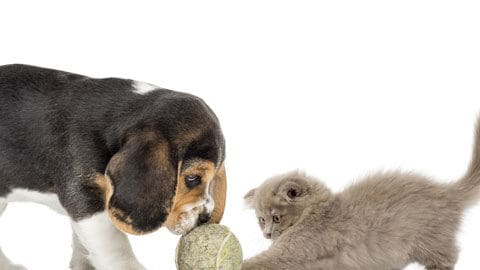DOG TALK® (and Kitties Too!) on 
Dog “Owner” — Is a Rose Still a Rose By Any Other Name?
#940B: Vivian Zottola, author of “Being a Good Dog in a Human’s World,” discusses some of the philosophical aspects of having a dog and whether words make a difference when you use the phrase “owner” or “pet parent” instead of “guardian.”
Dogs Rescuing Teens from a Life of Crime
#940A: Joan Dalton's book “Second Chances” chronicles a program for youth in Oregon’s toughest juvenile detention facility, where they pull the least adoptable dogs from the local shelter and let these young men train them for adoption. Miraculously, 95% of the participants were never incarcerated again.
Foxes Saved from Becoming Fur Collars
#939B: Nicole Navarro — founder of Pawsitive Beginnings, located in Key Largo, Florida — describes her sanctuary for foxes rescued from the fur trade, partners with organizations like the Florida Keys Children’s Shelter, using the foxes’ stories of survival and resilience as therapeutic tools to help youth on their own paths to healing.
How to See Bats in the Dark
#939A: Charles Hood, the naturalist photographer, talks about his full-of-surprises book “Nature at Night: Discover the Hidden World That Comes Alive After Dark,” and how you can turn your cell phone into a bat detector.
Thirteen Bully Breed Rescued Dogs in Her "Scratch & Dent” Pack
#938B: Tracy Kinney in Batavia Illinois says if she were a canine she’d be a bully type dog — meanwhile she has trained 9 of her 13 rescued Bullies to be registered therapy dogs (English Bull Dog, Pit bull, Boxer, French Bulldogs, Pug, Staffordshire Bull Terrier, Bull Terrier). Getting them to line up for a yearly group photo is a Facebook feat!
Purple Leash Project — Keeping Women, Children & Pets Safe
#938A: Lorie Westhoff from Purina’s Purple Leash Project talks about their partnership with Red Rover, the non-profit that is working to have more pet-friendly domestic violence shelters able to accept pets, since not being able to take the family pet(s) is a barrier to leaving an abusive relationship.
A Growl is a Wonderful Noise!
#937B: British dog trainer Mark Bridger-Prescott — the owner of Bone Canis and canine behaviourist with a degree-level qualification in Advanced Canine Behaviour — says the problem with aggressive dogs begins with people ignoring signs of a dog’s discomfort. “When a dog growls you need to say, ‘Sorry, Mate. Thank you for growling and letting me know you needed space.’”
The Jane Goodall of Hares
#937A: Chloe Dalton's illuminating and luminous memoir "Raising Hare,” describes with poetic delicacy the powerful yet fragile bond she had caring for a wild hare, which became "semi-domesticated" of her own volition.
A Ray of Hope About the Plastics Polluting Nature
#936B: Aditya Siroya explains how rePurpose Global has funded projects across Asia, South America and Africa to recover 30 million pounds of plastic waste from nature, while supporting more than 2,000 Waste Workers at the front lines. And what happens to all the plastic bags with our pet foods in them?
The Naturalist Author Who First Showed Us That Octopuses Have Souls
#936A: Sy Montgomery’s ground-breaking, award-winning book “Soul of an Octopus” is even more relevant now than when it was first published, as we discover that everything depicted in the bestselling novel called “that octopus book” (“Remarkably Bright Creatures”) is factually-based on the wily brilliance of these multi-armed creatures.






